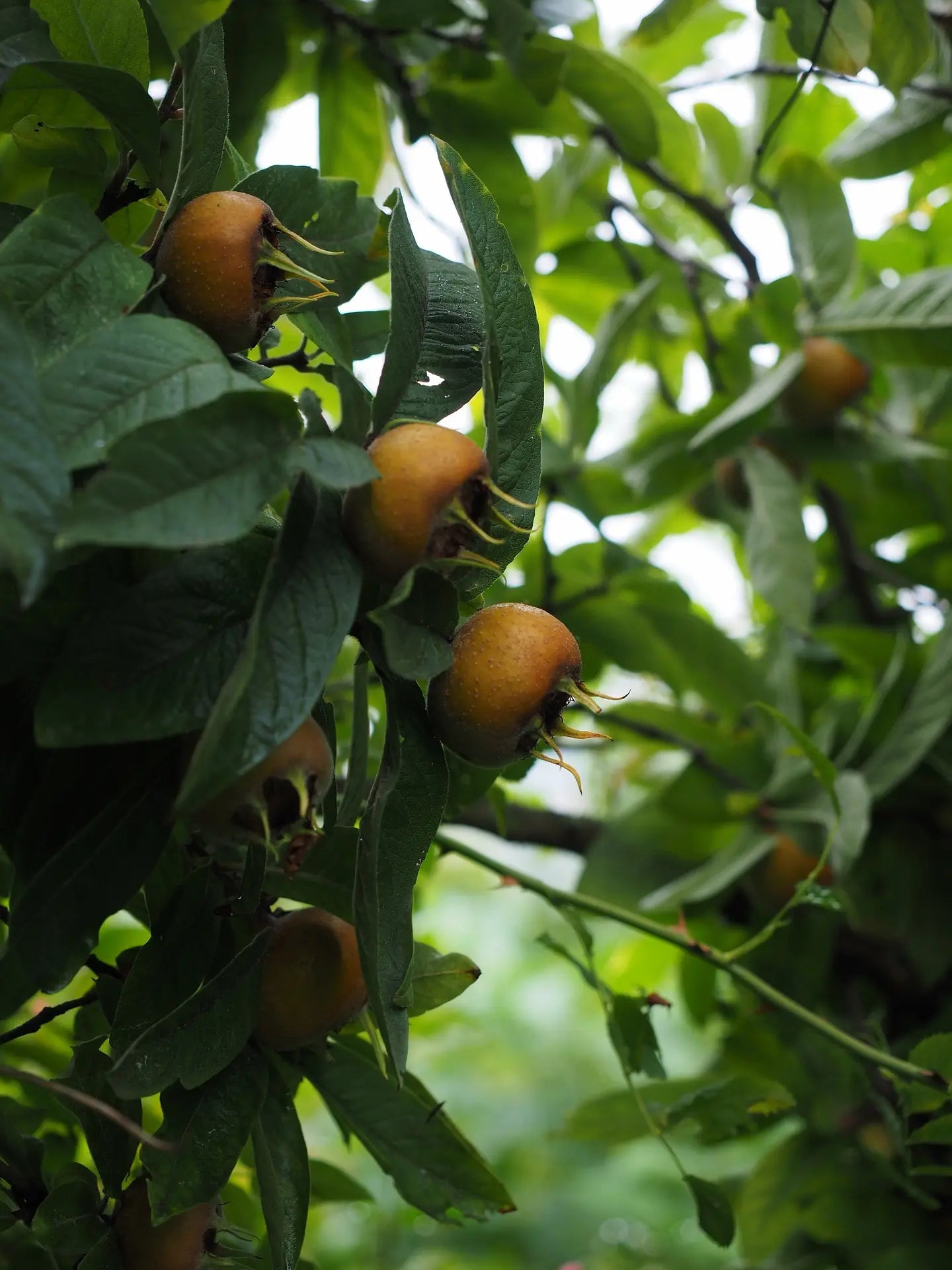-
Delivery from 10 plants to France, Switzerland and Europe
Delivery method -
Fruit Tree Wholesale Supplier
About Us -
Quality Fruit Tree Plants
Technical itinerary
Nottingham Medlar Half-Standard Tree 6-8 cm diameter bare-root
Nottingham Medlar Half-Standard Tree 6-8 cm diameter bare-root
The prices shown are our base prices for large volumes. Depending on the quantity ordered and the producers’ pricing scales, the rate may be adjusted upward. Each quote is personalized to ensure you receive a fair price.
Mini order 10 units / Multiple orders 10 units (FRS202412002)
Couldn't load pickup availability
 Buy now and get it delivered when you're ready to plant - Add your desired date to your quote request
Buy now and get it delivered when you're ready to plant - Add your desired date to your quote request
- Delivery from 10 plants to France, Switzerland and Europe

Nottingham Medlar Variety Fact Sheet
- Fruit Flesh Color: Pale yellow, sweet with a hint of acidity
- Skin color: Mature brown, golden brown
- Size and shape: Approximately 4 cm in diameter, weighing between 25 and 30 grams, round or oval
- Tree size: Shrub that can reach approximately 3 meters in height
- Fruit maturity: From mid-October, eaten overripe (soft) from the end of October
- Fruit taste: Pronounced caramel flavor, somewhere between apple and pear, sweet and sour
- Earliness of the variety: Early flowering in June
- Fruiting period: Ripe in autumn, harvested from late October when the fruits are soft
- Disease resistance and storage: Hardy, not very susceptible to disease. The fruits have a relatively short storage life.
- Variety Yield: A mature tree can produce up to 90 kg of fruit per year.
- Is this variety self-fertile? Yes, self-fertile.
- Commercial use: Fresh consumption after bletting, jams, syrups, compotes.
- Comments: Originating in England (circa 1850). The wood is hard and was used to make tool handles.
Quick read / the essentials on the 'Nottingham' Medlar
The 'Nottingham' medlar (Mespilus germanica) is an old variety, native to England, renowned for its hardiness , regular production and the taste of its fruits . Appreciated by producers and processors, it offers medium-sized medlars with a sweet and slightly acidic taste, ideal for consumption after ripening or for artisanal processing. Thanks to its late flowering in June, it is protected from spring frosts, which ensures a stable harvest every year.
If you are looking to buy Nottingham medlar plants , it is recommended that you purchase from a specialist medlar plant wholesaler . This ensures healthy, well-grafted plants that are well-adapted to French climatic conditions. This tree grows to 3 to 4 metres in height and has a bushy habit , with deciduous foliage that offers magnificent autumn colours.
The fruits of the 'Nottingham' medlar measure about 4 cm in diameter and weigh between 25 and 30 grams . Their pale yellow flesh, with a creamy texture, develops aromas reminiscent of apple and pear, with caramelized notes after bletting. These medlars are harvested from the end of October and are mainly used in jams, jellies, compotes and syrups .
This medlar adapts to various types of soil , provided they are well-drained and rich in organic matter . It tolerates slightly acidic to neutral soils , but does not appreciate an excess of limestone. Regular watering is recommended during the first years of planting to ensure good root development.
To optimize the productivity and anchoring of the tree, it is recommended to choose a suitable rootstock :
- Quince (Cydonia oblonga) : promotes rapid fruit set and adapts to cool soils.
- French pear tree (Pyrus communis) : suitable for loamy soils and guarantees balanced growth.
- Hawthorn (Crataegus oxyacantha) : ideal for poor soils, it strengthens the tree's resistance.
Growers wishing to purchase Nottingham medlar plants should choose a specialist medlar plant wholesale supplier , guaranteeing quality plants for sustainable and profitable cultivation.
Presentation of the Medlar 'Nottingham'
The 'Nottingham' medlar ( Mespilus germanica ) is an English variety renowned for the quality of its fruit and its hardiness. Created around 1850 by the biologist and nurseryman R. Hogg on a quince graft, this tree is appreciated for its regular production and its fruit with a characteristic taste. Its interest lies in its adaptation to French climatic conditions and in the taste value of its medlars, prized for their unique flavor and their use in artisanal processing.
Origin and History
Native to England, the 'Nottingham' medlar was developed in the 19th century and quickly became one of the most widely cultivated varieties in Europe. It is particularly appreciated for its medium-sized fruits, compact habit, and good disease resistance.
Tree Characteristics
The 'Nottingham' medlar is a moderately growing tree that reaches 3 to 4 meters in height at maturity. Its deciduous foliage takes on beautiful autumnal hues and its bushy habit gives it an ornamental appearance. It produces white flowers in early June, which protects it from late frosts and ensures regular fruiting.
Qualities of Fruits
The fruits of the 'Nottingham' medlar are medium-sized, measuring about 4 cm in diameter and weighing between 25 and 30 grams. Their brown, slightly rough skin envelops a pale yellow, sweet, and slightly tart flesh. Their flavor is somewhere between apple and pear, with occasional notes of caramel.
These medlars are eaten overripe, after natural ripening, generally from the end of October. They are well suited to processing into jams, jellies and compotes, and are also used in baking and syrup.
Growing Conditions
The 'Nottingham' medlar is a hardy tree, able to withstand temperatures down to -14°C. It prefers well-drained soil, rich in organic matter, and slightly acidic to neutral. Although it tolerates various soil types, it thrives best in the absence of excessive lime.
The ideal exposure is full sun or partial shade. It is recommended to provide it with regular watering during the first years of planting, as well as an organic fertilizer to encourage its rooting and fruiting. Gentle pruning can be carried out to maintain a balance between wood development and fruit production.
Pollination and Productivity
The 'Nottingham' medlar is self-fertile, meaning it can bear fruit without the need for another medlar tree nearby. However, the presence of bees and other pollinating insects can improve yield.
At maturity, a well-maintained tree can produce up to 90 kg of fruit per year. Its late flowering helps prevent damage from spring frosts, ensuring consistent production.
Resistance to Diseases and Parasites
The 'Nottingham' medlar is generally disease resistant, although it can be prone to brown rot and powdery mildew in certain humid conditions. Good air circulation around the tree and preventative treatments with Bordeaux mixture can help limit these risks.
Regarding pests, it can occasionally be attacked by aphids or scale insects. The introduction of natural auxiliaries, such as ladybugs and lacewings, helps maintain a biological balance in the orchard.
Uses and Valorization of Fruits
Medlars from the 'Nottingham' medlar tree are prized for their creamy texture and delicate flavor. They are primarily used in artisanal processing, particularly in jams, syrups, and compotes. Their unique flavor makes them a sought-after ingredient for desserts and lightly fermented beverages.
The fruit can also be eaten raw after bleating, cut in half and eaten with a spoon, or squeezed to extract the pulp.
Compatible Rootstocks
The choice of rootstock influences the tree's vigor and adaptation to local conditions. The main rootstocks recommended for the 'Nottingham' medlar in France are:
- Hawthorn ( Crataegus oxyacantha ) , ideal for loam soils, guaranteeing good adaptation and balanced growth.
- French pear tree ( Pyrus communis ) , suitable for loamy soils and promoting rapid fruiting.
- Quince ( Cydonia oblonga ) , recommended for cool soils, with good cold resistance and a positive influence on the longevity of the tree.
Benefits for Producers
The 'Nottingham' medlar tree offers several advantages for apple and medlar growers in France. Its self-fertility makes it easy to establish orchards without pollination constraints. Its hardiness and disease resistance reduce the need for phytosanitary treatments, making it an attractive option for organic farming.
Its regular production and late flowering make it a reliable variety, limiting the risks associated with climatic hazards. Finally, the taste quality of its fruits and their processing potential offer opportunities for commercial development, both on local markets and in specialized sales channels.
Recommendations for Marketing
Nurserymen and distributors wishing to promote the 'Nottingham' Medlar can highlight several strategic aspects:
- The historical origin and quality of the fruit , with emphasis on its development in England and its recognition for its distinctive taste.
- Ease of cultivation , highlighting its hardiness, self-fertility and resistance to disease.
- Varied culinary uses , offering recipes and transformation ideas for consumers.
- Its ornamental interest , mentioning its decorative foliage and its attractiveness to pollinators.
- Growing and maintenance advice , providing guidance on soil selection, watering and pruning to maximize production.
The 'Nottingham' Medlar is a choice variety for professionals wishing to diversify their range of old fruits while benefiting from stable production and fruits with appreciated organoleptic qualities.
To summarize: Medlar 'Nottingham'
The 'Nottingham' medlar is a hardy variety, appreciated for its late flowering , disease resistance and fruit quality . It is a strategic choice for growers looking for an undemanding and profitable fruit tree. Its self-fertility allows for regular production without the need for additional pollinators, although the presence of bees improves yield.
If you are considering buying Nottingham medlar plants , turn to a specialist medlar plant wholesaler to ensure a reliable and efficient supply. Its annual production can reach 90 kg of fruit per tree , which makes it an interesting variety for artisanal and commercial development .
Nottingham medlars , harvested in October-November , develop their full flavor after brittleness. Their creamy flesh and subtle taste between apple and pear make them a sought-after ingredient for:
- Processing into jams, jellies and compotes
- Preparation of syrups and fermented drinks
- Use in traditional pastries and desserts
The 'Nottingham' medlar is resistant to common diseases , although it can be susceptible to brown rot and powdery mildew in humid conditions. Good leaf aeration and preventative treatments with Bordeaux mixture are sufficient to limit these risks.
Thanks to its moderate growth (3 to 4 meters in height) and its bushy habit , it fits easily into professional orchards or fruit production gardens . It appreciates a sunny to partial shade exposure , with well-drained soil , and reduced maintenance.
The 'Nottingham' medlar is a particularly interesting variety for producers wishing to diversify their orchard with an old, tasty fruit suitable for short supply chains . Its high yield, low susceptibility to disease and its artisanal value make it a promising crop for local and specialist markets.
To ensure successful and productive cultivation, it is essential to purchase Nottingham medlar plants from a specialist medlar plant wholesale supplier , guaranteeing high quality plants adapted to the requirements of the French market.
-
Nottingham Medlar Scion bare-root organic
Regular price €14,90 EURRegular priceUnit price / per -
Nottingham Medlar Half-Standard Tree 8-10 cm diameter bare-root
Regular price €23,00 EURRegular priceUnit price / per -
Nottingham Medlar Half-Standard Tree 6-8 cm diameter bare-root
Regular price €22,20 EURRegular priceUnit price / per -
Nottingham Medlar Half-Standard Tree 10-12 cm diameter bare-root
Regular price €26,00 EURRegular priceUnit price / per



